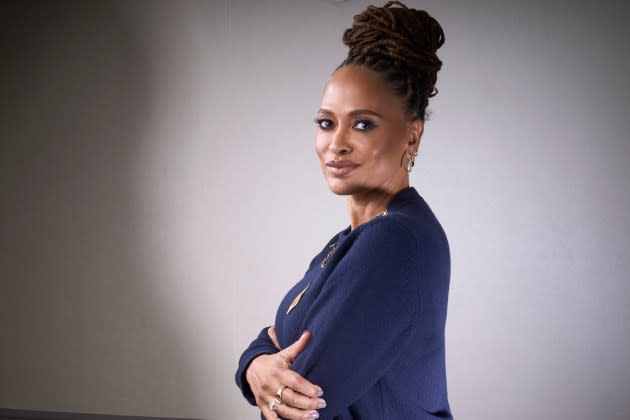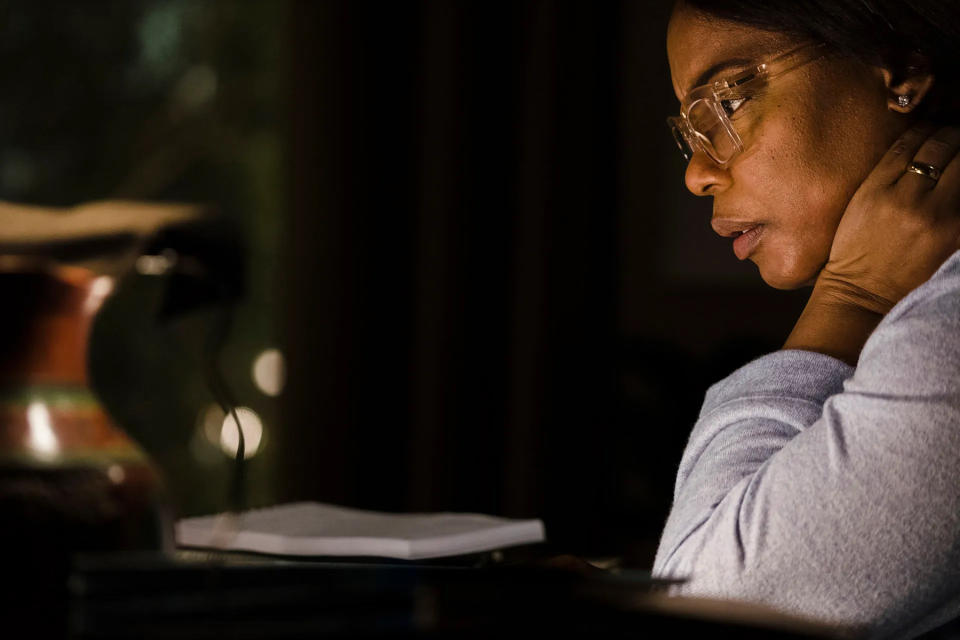Ava DuVernay Wants to Expand Your Mind
- Oops!Something went wrong.Please try again later.
- Oops!Something went wrong.Please try again later.
- Oops!Something went wrong.Please try again later.
- Oops!Something went wrong.Please try again later.

For Ava DuVernay, whose projects like 13th, Selma, and When They See Us challenge viewers to contend with the gut-wrenching racism that’s colored American history, Origin provides a more global perspective on racial inequality and its foundation within social hierarchies.
“I try to make soul food with my movies, not junk food, not fast food,” DuVernay tells Rolling Stone. “Not stuff that goes in and goes straight up the next day, but stuff that sticks to your ribs.”
More from Rolling Stone
Greta Gerwig's Oscar Snub for 'Barbie' Is Classic Academy BS
'No Ken Without Barbie': Ryan Gosling Slams Greta Gerwig, Margot Robbie Oscar Snubs
Why Charles Melton's Oscar Snub for 'May December' Really Stings
Origin, which DuVernay wrote and directed, draws inspiration from Isabel Wilkerson’s best-selling book Caste, and follows the author, played by Aunjanue Ellis-Taylor, on an intercontinental journey to understand the categorization of people through status and power. It begins with a harrowing reenactment of Trayvon Martin’s death and then travels to Nazi Germany, Jim Crow-era Mississippi, and India to link global systems of oppression. The film also weaves in moments from Wilkerson’s personal life, like her compassionate mother (Emily Yancy), chatty cousin (Niecy Nash-Betts), and supportive husband (Jon Bernthal), along with their subsequent deaths around the time of her research and travels.
When DuVernay first sat down to read Caste, she couldn’t put the book down, pausing every few pages to research its breakdown of social hierarchies. She was eager to share the book with a larger audience, but film execs told DuVernay that Caste, released after the murder of George Floyd, could not be adapted into a feature film.
This only fueled her passion. The director reached out to philanthropists from the Ford Foundation, Melinda French Gates, NBA stars like Chris Paul, and others to foot the bill for her $38 million picture. Filmed over 37 days across three continents, DuVernay got the feature completed ahead of the Venice Film Festival in September 2023, where she became the first African-American woman to have a film there in competition.
“I really felt so much emotion as I was moving through the history, the facts, and figures, the anthropological thesis that Isabel Wilkerson shares,” DuVernay says. “So in thinking about trying to go beyond the conveying of information to something that would engender empathy and emotion in my experience, working with actors in a comparative space does that best.”
Rolling Stone spoke to DuVernay — on Martin Luther King Day, as it happens — about breaking down caste systems in Origin, examining Selma nearly a decade later, and acknowledging the strides of inclusivity during awards season.
How would you describe caste as it relates to race?
When you go past and you drill down underneath race, when you drill down underneath sexism, when you drill down underneath antisemitism, when you drill down underneath homophobia, you hit the rock that’s underneath, and that’s caste, which is a very fundamental way in which human beings organize themselves in hierarchy, according to status and power.

What was it like working with Pulitzer Prize-winning author Isabel Wilkerson, and deciding to include her personal life in the film?
She was really lovely in sharing the very tender relationship with her mother, the caregiving that she provided, and their relationship toward the end of her life; her beautiful romance with her husband, Brett. But she had written about both publicly on her Facebook when both of them had passed. She had never mentioned in any way that I saw publicly Marion, and so that character, played by Niecy Nash-Betts, was a character that she shared with me as I was asking her about people who were close to her during the time of her writing or in her writing process. I just think it’s incredibly generous and incredibly gracious to share very tough parts of your life, the people who we grieved, the people who’ve gone before us, and tell a stranger, a storyteller, those stories.
You originally planned to work with Netflix on this film, but instead the film was released through Neon. Was there any resistance from Netflix on your creative vision?
It was a timing issue, and I’ve had beautiful collaborations with Netflix — 13th, When They See Us, Colin in Black and White. We were going to hold hands on this project. I wanted to have it out this year. They wanted to make it this year possibly to be out next year. But I believe really strongly that the ideas in the book and ideas that we share in the film should be a part of the conversation as we enter an election year, as we’re now in an election year, and that, the more we have fluency on some of these topics, and are able to have new vocabulary to talk about the ways that we’re feeling and things that we’re dealing with, it might lead to positive outcomes. So, in my desire to have it out sooner than later, we went out and Netflix was kind enough to let us take the movie and make it independently.
It’s Martin Luther King Day. How are you celebrating or honoring Dr. King?
By being Black and blessed.
As we reflect on the Academy Award-nominated picture Selma nearly a decade ago, how does the film sit with you?
I’m proud of it and I’m happy for the life that it’s had. It continues to be something that people go to on this King weekend. It’s become a widely-watched film around Juneteenth holidays, during Black History Month, and it’s something that’s continued to follow me around the world. When I was at the Venice Film Festival, presenting Origin, Italian people knew me as the woman who made Selma and that’s a beautiful film and story to be associated with.
The Selma snubs at the Oscars ignited the #OscarsSoWhite campaign. Now you serve on the Acadmedy Board of Governors, within the directors branch. Do you feel that the Oscars or award season as a whole has changed much?
[There are ] some really beautiful films in the mix this year, and I think the other thing that I like to focus on is the fact that the films are being made. The filmmakers are finding ways to amplify their stories, their voices, and are fortunate to be a part of that group. There are so many filmmakers out there that are struggling to tell their stories and get these films off the ground. So, the fact that this year you have a handful of films from different kinds of voices, whether it’s A.V. Rockwell, or whether it’s Blitz [Bazawule] or Cord [Jefferson] or myself, men and women during this season where everyone turns their attention to a certain kind of movie. There are a lot in the mix — a lot, relatively speaking, as we contrast it with what usually is there. So, I think it’s positive.
Going back to Origin, the film is an example of diverse storytelling as it examines global class systems in Nazi Germany, Jim Crow-era Mississippi, and India across several time periods. Why do you think this film is particularly important now?
I don’t think there is a “why now” — I think it’s “always.” I think that we need to be talking about these issues, excavating our history, looking at the commonalities between folks who are struggling around the world. I’m always resisting people saying, “Oh, this is really timely.” It’s always timely. It’s always timely to talk about dignity and justice and the spaces where it’s absent. So, the “why now” is because we must.
Best of Rolling Stone

